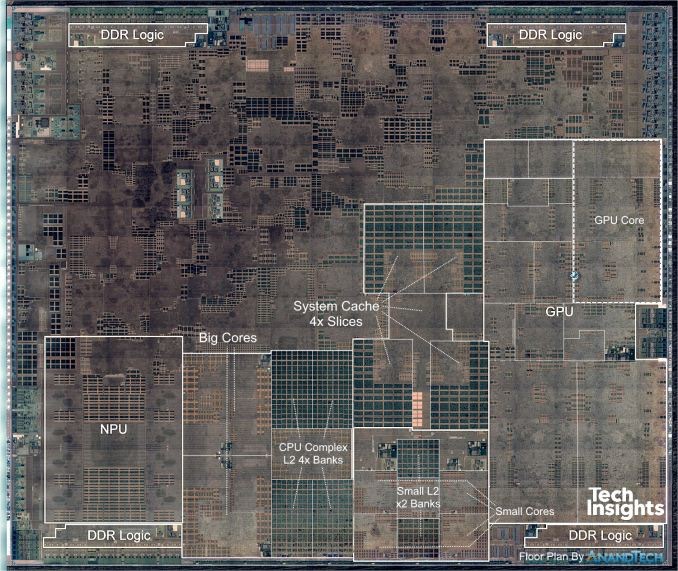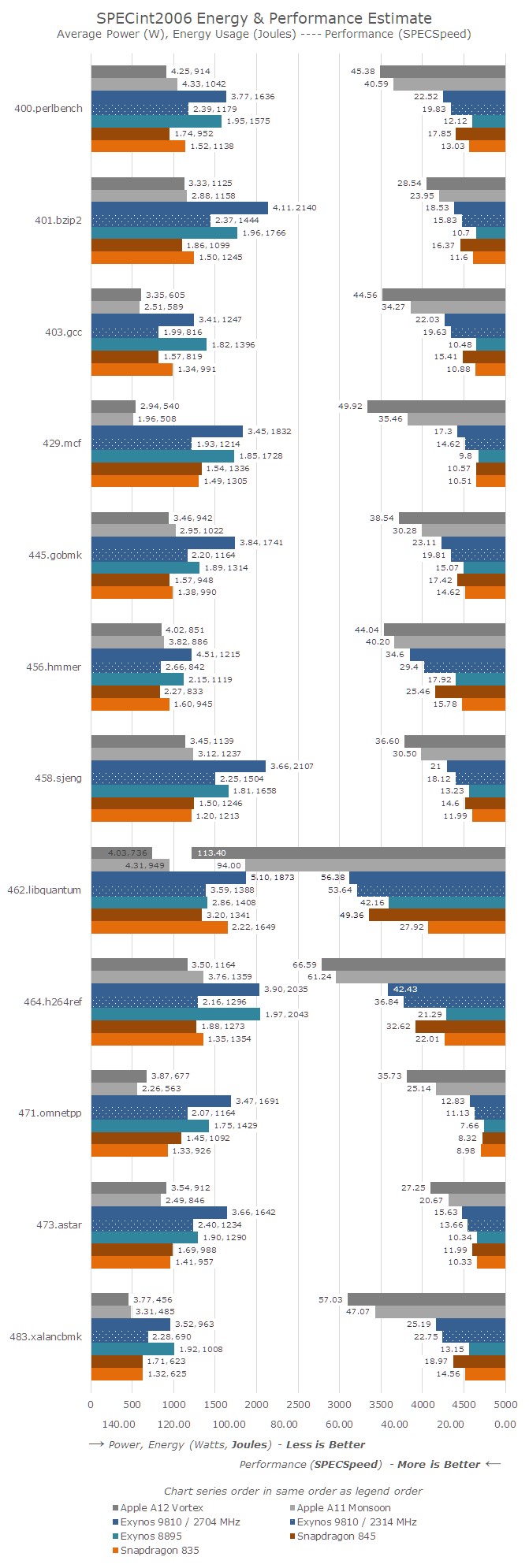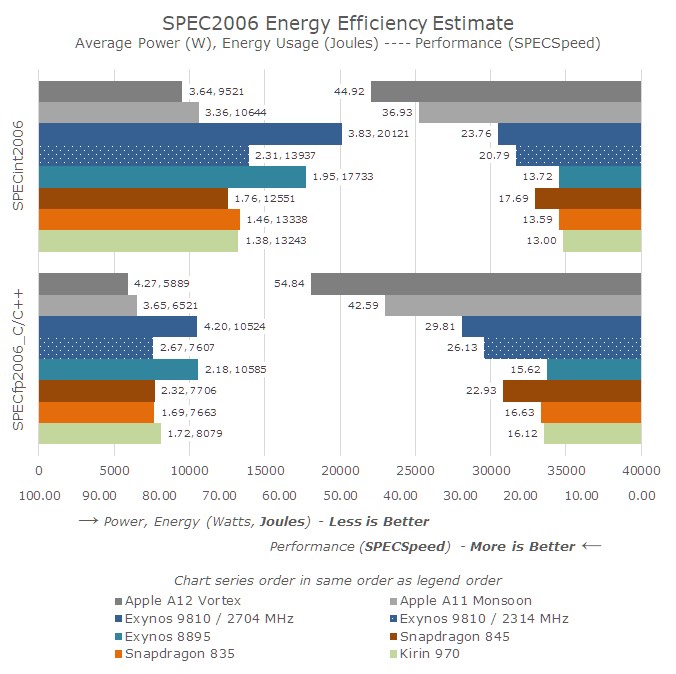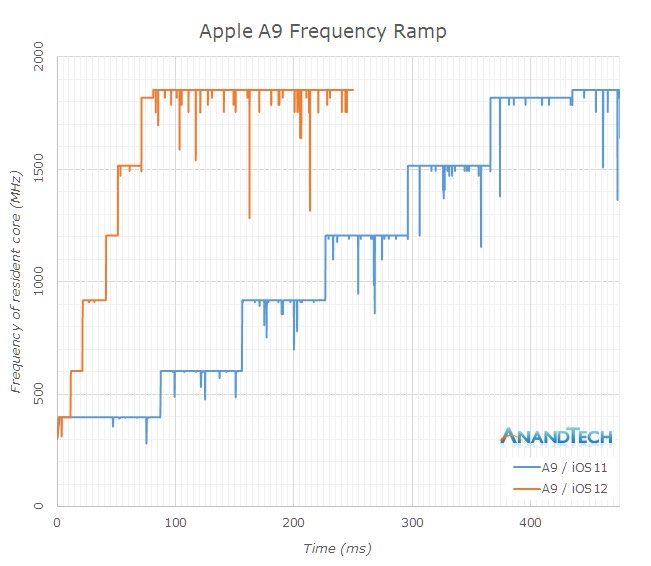AnandTech Calls A12 Bionic in iPhone XS 'Just Margins Off' Best Desktop CPUs in New ReviewAnandTech, known for in-depth reviews of new Apple products, today
published a lengthy review of the
iPhone XS and XS Max, Apple's newest flagship iPhones.
AnandTech's review
takes a deep dive into the A12 chip in the two smartphones, which is the first commercially available 7nm silicon.
<img src="

" alt="" width="678" height="571" class="aligncenter size-full wp-image-659517" />
<center>Image of A12 SoC via TechInsights with labeling by AnandTech</center>According to
AnandTech, the A12 chip features a major revamp of the neural accelerator, a redesigned system cache that features the "biggest change since its introduction in the A7," significant changes to the CPU core, and memory compression for the GPU, all of which has led to impressive performance improvements.
Based on SPECint2006 benchmarking, the A12 performed an average of 24 percent better than the A11 in the previous-generation devices. When it comes to power efficiency, the A12 improved by 12 percent, but with memory heavy workloads, power consumption was up, for an average power usage of ~3.36W on the A11 to 3.64W on the A12.
<img src="

" alt="" width="671" height="1990" class="aligncenter size-full wp-image-659518" />
SPECfp benchmarking saw average performance gains of 28 percent, and again, workloads with major improvements also resulted in increased power consumption.
AnandTech's benchmarking tests suggest that the A12's Vortex cores and architectural improvements offer a "much higher performance advantage than Apple's marketing materials promote." Apple's A12 beat the best Android SoCs both in performance and power efficiency.
<img src="

" alt="" width="676" height="674" class="aligncenter size-full wp-image-659519" />
The contrast to the best Android SoCs have to offer is extremely stark - both in terms of performance as well as in power efficiency. Apple's SoCs have better energy efficiency than all recent Android SoCs while having a nearly 2x performance advantage. I wouldn't be surprised that if we were to normalise for energy used, Apple would have a 3x performance efficiency lead.
AnandTech says that it's "quite astonishing" how close the A12 and the previous-generation A11 are to desktop CPUs, with "very small margins until Apple’s mobile SoCs outperform the fastest desktop CPUs in terms of ST performance."
As part of the review,
AnandTech also offered a look at how Apple has improved performance in older devices by tweaking scaling performance. The A9 in the iPhone 6s, for example, took 435ms for the CPU to reach maximum frequency, but that time was cut to 80ms in
iOS 12 for a "great boost to performance in shorter interactive workloads."
Similar improvements were made to the A10 (going from a 400ms ramp up time to 210ms), but there was little change to the A11.
<img src="

" alt="" width="651" height="566" class="aligncenter size-full wp-image-659520" />
All in all,
AnandTech said the iPhone XS and XS Max are a "big shift" for Apple's lineup with a "beast of an SoC" that's offering performance improvements of up to 40 percent.
Apple's marketing department was really underselling the improvements here by just quoting 15% - a lot of workloads will be seeing performance improvements I estimate to be around 40%, with even greater improvements in some corner-cases. Apple's CPU have gotten so performant now, that we're just margins off the best desktop CPUs; it will be interesting to see how the coming years evolve, and what this means for Apple's non-mobile products.
The
full iPhone XS and XS Max review from AnandTech is well worth checking out for those who would like to get a deeper technical look at the components inside the two new devices. It goes into much greater detail on the CPU and GPU in the iPhone XS and XS Max, while also taking a look at the camera, battery, display, and other components.
<div class="linkback">Related Roundup:
iPhone XS</div><div class="linkback">Buyer's Guide:
iPhone XS (Buy Now)</div>
Discuss this article in our forums
<div class="feedflare">
<img src="[url]http://feeds.feedburner.com/~ff/MacRumors-Front?d=yIl2AUoC8zA" border="0"></img>[/url]
<img src="[url]http://feeds.feedburner.com/~ff/MacRumors-Front?d=6W8y8wAjSf4" border="0"></img>[/url]
<img src="[url]http://feeds.feedburner.com/~ff/MacRumors-Front?d=qj6IDK7rITs" border="0"></img>[/url]
</div><img src="
http://feeds.feedburner.com/~r/MacRumors-Front/~4/6kOWcPDa1e0" height="1" width="1" alt=""/>
Source:
AnandTech Calls A12 Bionic in iPhone XS 'Just Margins Off' Best Desktop CPUs in New Review